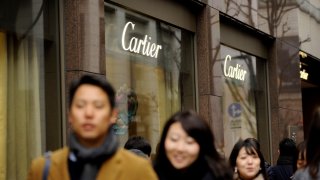- A strengthening of the Japanese yen weighed on Cartier-owner Richemont’s fiscal first-quarter sales.
- A weak yen had boosted international tourism and luxury spend in the East Asian country last year.
- The Japanese yen began steadily depreciating in 2024 after the Bank of Japan brought an end to negative interest rates.
A currency-fueled spending splurge in the key Japanese luxury market has finally abated, weighing on sales at Cartier-owner
Richemont
.
Stream San Diego News for free, 24/7, wherever you are with NBC 7.
The Swiss luxury group’s Japan sales declined 15% year-on-year at constant exchange rates in the fiscal first quarter, it said Wednesday in its fiscal first-quarter sales report.
It follows a 59% jump in revenues in the same quarter last year, as a weaker yen sparked a surge in international tourism and luxury spend.
Get top local San Diego stories delivered to you every morning with our News Headlines newsletter.
Shares were up 0.6% by 8:35 a.m. London time.
The
Japanese yen
began steadily depreciating last year after the Bank of Japan brought an end to negative interest rates and terminated its yield curve control policy in March. In June of that year, the Japanese currency weakened to
38-year lows
, crossing the 161 mark against the dollar.
Richemont, whose brands also include Van Cleef & Arpels and Buccellati, benefitted from that weakness throughout last year, reporting 20% to 25% sales growth in Japan over consecutive quarters.
Money Report
Renault shares plunge 16% after French carmaker lowers guidance, appoints new interim CEO
CNBC’s The China Connection newsletter: From Didi to DeepSeek
It was not alone. Other major luxury groups
LVMH
,
Kering
and Burberry
all noted the uptick
, led in particular by Chinese shoppers flocking to the East Asian country.
However, a recent strengthening of the yen in the first half of 2025 has put paid to those trends.
“In Japan, sales declined by 15% against a demanding +59% comparative in the prior-year period, with a strengthening Yen strongly reducing tourist spend, most notably from Chinese clientele, whilst local demand remained positive,” Richemont said in a statement accompanying the Wednesday results.
Richemont nevertheless has emerged a rare outlier in a wider luxury downturn, as demand among wealthy shoppers for its high-end jewelry continues to shine.
Revenues at the Swiss luxury group rose 6% year-on-year at constant exchange rates to 5.41 billion euros ($6.28 billion) in the three months to the end of June, slightly ahead of the 5.37 billion euros forecast by analysts in an LSEG poll.
Sales at the group’s Jewellery Maisons division
continued to lead the charge
, rising 11% at constant exchange rates.
Revenues within it Specialist Watchmakers division, which features Piaget and Roger Dubuis, nevertheless continued to lag, declining 7% over the period.
The group said the weakness largely reflected declining sales in China, Hong Kong, Macau and Japan, even as sales in the Americas rose.
Also on CNBC
-
Tax cuts for private jet buyers expected to lead to surge in sales
-
Tariffs are hitting European firms hard. Here are the sectors to watch
-
This ‘quiet luxury’ Italian brand is shaking off tariff woes as sales jump







